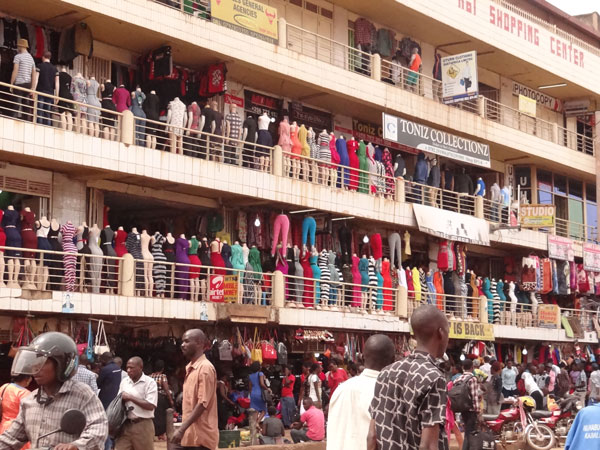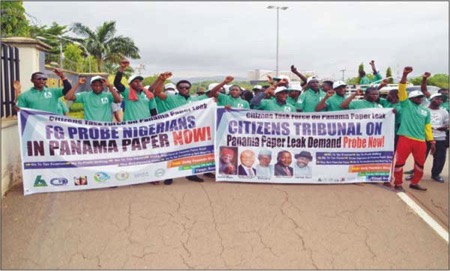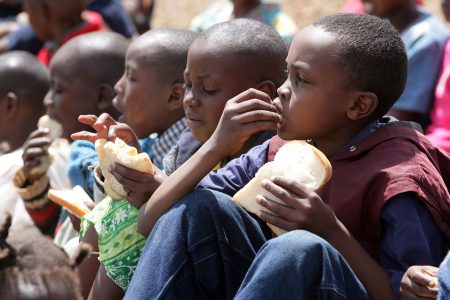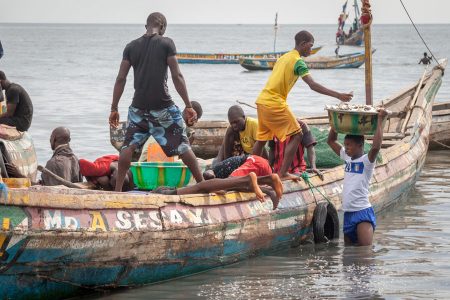Perhaps there has been a change of heart and those things not “typically German” are now not automatically bad or dangerous. Nevertheless, I find the majority of articles still lack a critical analysis of the causes of the refugees’ flight.
Who is behind these wars? What geopolitical interests are at stake? From where do the weapons come? Which companies are exploiting these countries? How does our way of life impact other lands? What are the consequences of the EU Free Trade Agreements (FTAs) on the Southern countries? Great prosperity and growth as predicted? Hardly. Instead, an increase in poverty, a lack of prospects, and thousandfold death in the wars. Perhaps this is a good reason to examine TTIP intensively.
Advancing economic interests by fomenting war in the name of democracy and humanrights?
Independent of the above, it must become clear to us that the causes of migration are partly our own responsibility. Political commitment to more ambitious climate protection, resource conservation and greater resource equity, fair trade and better cooperation on development are crucial for the sustainable development of global society. It should not and must not be that, as reported by Oxfam, the richest one percent of the world’s population owns more than the remaining 99 percent.
How long will weapons be used to secure economic interests? Do we actually believe that we can remain comfortably on our island of prosperity, cheaply procuring the resources needed for own our well-being, while walling out the misery of the world with barbed wire? Reality will catch up with us on our doorstep.
In my opinion, the press is responsible for bringing these issues to the attention of the citizenry that is, the impact of our policies, nationally or at the level of the EU, our economic activities and our patterns of consumption on other countries. Absurdly, political comedy shows (!!!) often explain the causes and consequences of the crises more eloquently than prominently scheduled talk shows or news programs. Comedy shows!
Poverty and lack of prospects – no reason for asylum?
Migration is not a new phenomenon. It is also normal and justifiable that European citizens are afraid of “mass immigration”. Nevertheless, before they condemn the refugees, they should look back on European history. Millions of Europeans, including many Germans, have emigrated for centuries due to poverty and in order to gain new possibilities. Are hunger and poverty not grounds for asylum? By that measure, those Europeans should not have been granted asylum in their host countries. Anyone today who believes that hunger, lack of prospects, insecurity and repression are not sufficient reasons to emigrate should put themselves in the position of those refugees.
It is also understandable that many Europeans are trying to secure and defend their wealth from the world’s poor. But we must remember that the basis of much of this wealth was colonial exploitation. An exploitation which continues unabated in many “independent” African countries due to the economic and political structures left behind at the end of the colonial era. We can no longer shut our eyes to this reality, which will catch up with us – and will do so sooner than we think. Today, many in Germany are protesting against TTIP. Now we must also raise our voices together against those German and EU free trade agreements, which have been concluded unilaterally to the detriment of the African countries.
Creating jobs through industrialisation of African countries
The youth of Africa will be a resource for the continent only if it is well educated and has good prospects for the future, otherwise it will be a ticking time bomb for Africa and Europe. Today, only about 20% of the refugees who come to Europe are from African countries. This number will certainly multiply if conditions are not altered drastically. According to the UN Population Development Report, Africa’s population will continue to grow massively – from 1.2 billion today to approximately 4.5 billion in 2100.
It is long overdue that the countries of Africa themselves utilise the vast resources of the continent and create jobs locally. If we are honestly trying to combat the causes of flight over the long term, then we need a socially responsible and humane economic policy – only thus can we create sustainable economies to the advantage of all continents.
Sogar die Boulevardpresse, die noch vor kurzem Ausländer, Flüchtlinge und Co. für Populismus und Verkaufszwecke genutzt hat, hat den Begriff Solidarität entdeckt und organisiert Fußball-Aktionen für Flüchtlinge. Vielleicht gibt es mittlerweile doch einen Sinneswandel dahingehend, dass nicht alles „typisch Deutsche“ schlecht oder gefährlich ist. Trotzdem vermisse ich in den meisten Berichten eine kritische Analyse der Fluchtursachen.
Wer steckt hinter diesen Kriegen? Welche geopolitischen Interessen werden verfolgt?Woher kommen die Waffen? Welche Unternehmen beuten diese Länder aus? Wie wirkt sich unsere Lebensart auf andere Länder aus? Welche Wirkungen haben die EU-Freihandelsabkommen (EPAs) mit den Ländern des Südens? Großen Wohlstand und Wachstum wie prognostiziert – doch wohl kaum. Stattdessen viel mehr Armut, Perspektivlosigkeit, tausendfachen Tod in den Kriegen. Vielleicht ist das ein Grund, warum wir uns intensiv mit TTIP beschäftigen sollten.
Wirtschaftsinteressen verfolgen durch das Anzetteln von Kriegen im Namen von Demokratie und Menschenrechten?
Unabhängig davon muss uns aber klar werden, dass die Ursachen für Migration zum Teil in unserer eigenen Mitverantwortung liegen. Das politische Engagement für einen anspruchsvolleren Klimaschutz, für Ressourceneinsparung sowie mehr Ressourcengerechtigkeit, fairer Handel und eine bessere Entwicklungszusammenarbeit sind wichtig, damit sich die Weltgesellschaft nachhaltig entwickeln kann. Es kann und darf nicht sein, dass laut Oxfam durch die ungleiche Vermögensverteilung das reichste eine Prozent der Weltbevölkerung im kommenden Jahr mehr als die restlichen 99 Prozent zusammen besitzt.
Wie lange werden die Waffen eingesetzt, um Wirtschaftsinteressen zu sichern? Haben wir tatsächlich gedacht, dass wir uns auf unserer Wohlstandsinsel bequem und günstig die Ressourcen beschaffen, die wir für unser Wohlergehen brauchen, und ansonsten die Türen vor dem Elend der Welt mit Stacheldraht verschließen? Die Realitäten holen uns vor unserer Haustür ein.
Diese Themen muss den Bürgern dieses Landes meiner Meinung nach von der Presse erklärt werden – dass nämlich unsere Politik, sei es auf nationaler oder EU-Ebene, unsere Wirtschaftsaktivitäten sowie unser Konsumverhalten gravierende Auswirkungen auf andere Länder haben. Absurderweise erläutern politische Comedy-Shows (!!!) die Ursachen und Folgen der Krisen häufig fairer als prominent besetzte Talkrunden oder Nachrichtensendungen. Man bedenke: Comedy-Shows!
Armut und Perspektivlosigkeit – kein Asylgrund?
Die Migrationsbewegung ist kein neues Phänomen. Es ist auch normal und berechtigt, dass Europas Bürger Angst vor einer „Massenzuwanderung“ haben. Trotzdem sollten diese, bevor sie die Flüchtlinge verurteilen, vor allem auf die europäische Geschichte zurückblicken. Millionen Europäer, darunter viele Deutsche, sind jahrhundertelang wegen Armut ausgewandert, um neue Perspektiven zu bekommen. Hunger und Armut sollen also keine Asylgründe darstellen? Das heisst im Umkehrschluss, damals hätten diese Europäer also in den Aufnahmeländern kein Asyl erhalten sollen. Wer heute sagt, dass Hunger, Perspektivlosigkeit, Unsicherheit und Repression keine ausreichenden Begründungen zum Auswandern sind, der sollte sich in die Lage jener Flüchtlinge hineinversetzen.
Es ist auch nachvollziehbar, dass viele Europäer versuchen, ihren Reichtum vor den Armen dieser Welt zu schützen und zu verteidigen. Ich möchte aber Alle daran erinnern, dass die Grundlage dieses Reichtums die Ausbeutung der Kolonien war und dass sie in vielen „unabhängigen“ Ländern Afrikas durch die hinterlassenen wirtschaftlichen und politischen Strukturen noch heute unvermindert weiter geht. Wir können nicht länger die Augen verschließen, die Realitäten werden uns einholen – schneller als wir denken. Heute protestieren viele Menschen in Deutschland gegen TTIP. Jetzt müssen wir gemeinsam auch gegen die einseitig zu Lasten der afrikanischen Länder abgeschlossenen Freihandelsabkommen Deutschlands und der EU protestieren.
Arbeitsplätze schaffen durch Industrialisierung der Länder Afrikas
Die Jugend Afrikas ist eine Bereicherung für den Kontinent, wenn sie gut gebildet ist und Zukunftsperspektiven hat, sonst wäre sie eine tickende Zeitbombe für Afrika und Europa. Heutzutage sind nur etwa 20 % der Flüchtlinge, die nach Europa kommen, aus afrikanischen Ländern. Diese Zahl wird sich vervielfachen, wenn die Zustände nicht drastisch verändert werden. Laut dem UN Bericht zur Bevölkerungsentwicklung wird die Einwohnerzahl auf dem Kontinent Afrika weiterhin massiv wachsen – bis 2100 von heute 1,2 auf rund 4,5 Milliarden.
Es ist höchste Zeit, dass die Länder Afrikas die Ressourcen des Kontinents selbst weiter verarbeiten und Arbeitsplätze vor Ort schaffen. Wenn wir es ehrlich damit meinen, die Fluchtursachen langfristig bekämpfen zu wollen, dann brauchen wir eine sozialverträgliche und menschliche Wirtschaftspolitik – nur sie kann nachhaltig sein und allen Kontinenten nutzen.
Lieber Leser, Afrika hat einen guten Freund verloren. Die Arbeit, die wir heute machen, das Bild Afrikas ausgewogen darzustellen, hat Henning Mankell jahrelang verkörpert. Wir werden ihn vermissen. Genießen Sie die Lektüre in diesem Heft!
Veye Tatah



